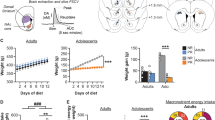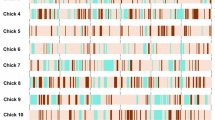Abstract
Serotonin (5HT) synthesis in brain is influenced by precursor (tryptophan (TRP)) concentrations, which are modified by food ingestion. Hence, in rats, a carbohydrate meal raises brain TRP and 5HT; a protein-containing meal does not, but little attention has focused on differences among dietary proteins. Recently, single meals containing different proteins have been shown to produce marked changes in TRP and 5HT. The present studies evaluate if such differences persist when rats ingest such diets chronically. Male rats were studied that ingested diets for 9 days containing zein, wheat gluten, soy protein, casein, or α-lactalbumin (17% dry weight). Brain TRP varied up to eightfold, and 5HT synthesis fivefold among the different protein groups. TYR and LEU concentrations, and catecholamine synthesis rate in brain varied much less. The effects of dietary protein on brain TRP and 5HT previously noted after single meals thus continue undiminished when such diets are consumed chronically.


Similar content being viewed by others
References
Fernstrom JD (1983) Role of precursor availability in the control of monoamine biosynthesis in brain. Physiol Rev 63:484–546
Fernstrom JD, Wurtman RJ (1972) Brain serotonin content: physiological regulation by plasma neutral amino acids. Science 178:414–416
Choi S, DiSilvio B, Fernstrom MH et al (2009) Meal ingestion, amino acids and brain neurotransmitters: effects of dietary protein source on serotonin and catecholamine synthesis rates. Physiol Behav 98:156–162
Wookey N (1979) Wheat gluten as a protein ingredient. J Am Oil Chem Soc 56:306–309
Subcommittee on Laboratory Animal Nutrition NRC (1995) Nutrient requirements of the laboratory rat. In: Nutrient requirements of laboratory animals. National Academy of Sciences, Washington, p 152
Scott MP, Darrigues A, Stahly TS et al (2008) Recurrent selection to alter grain methionine concentration and improve nutritional value of maize. Crop Sci 48:1705–1713
Markus CR, Olivier B, Panhuysen GE et al (2000) The bovine protein alpha-lactalbumin increases the plasma ratio of tryptophan to the other large neutral amino acids, and in vulnerable subjects raises brain serotonin activity, reduces cortisol concentration, and improves mood under stress. Am J Clin Nutr 71:1536–1544
Orosco M, Rouch C, Beslot F et al (2004) Alpha-lactalbumin-enriched diets enhance serotonin release and induce anxiolytic and rewarding effects in the rat. Behav Brain Res 148:1–10
Fernstrom MH, Fernstrom JD (1987) Protein consumption increases tyrosine concentration and in vivo tyrosine hydroxylation rate in the light-adapted rat retina. Brain Res 401:392–396
Fernstrom MH, Fernstrom JD (1995) Effect of chronic protein ingestion on rat central nervous system tyrosine levels and in vivo tyrosine hydroxylation rate. Brain Res 672:97–103
Cota D, Proulx K, Smith KAB et al (2006) Hypothalamic mTOR signaling regulates food intake. Science 312:927–930
Morrison CD, Xi X, White CL et al (2007) Amino acids inhibit Agrp gene expression via an mTOR-dependent mechanism. Am J Physiol 293:E165–E171
Carlsson A, Lindqvist M (1978) Dependence of 5-HT and catecholamine synthesis on concentrations of precursor amino acids in rat brain. Naunyn Schmied Arch Pharmacol 303:157–164
Sugrue MF (1987) Neuropharmacology of drugs affecting food intake. Pharmac Ther 32:145–182
Spiegelman BM, Flier JS (2001) Obesity and the regulation of energy balance. Cell 104:531–543
Colmenares JL, Wurtman RJ, Fernstrom JD (1975) Effects of ingestion of a carbohydrate-fat meal on the levels and synthesis of 5-hydroxyindoles in various regions of the rat central nervous system. J Neurochem 25:825–829
Reeves PG, Nielsen FH, Fahey GC Jr (1993) AIN-93 purified diets for laboratory rodents: final report of the American Institute of Nutrition ad hoc writing committee on the reformulation of the AIN-76A rodent diet. J Nutr 123:1939–1951
Bongiovanni R, Yamamoto BK, Jaskiw GE (2001) Improved method for the measurement of large neutral amino acids in biological matrices. J Chromatog B 754:369–376
Fernstrom JD, Faller DV (1978) Neutral amino acids in the brain: changes in response to food ingestion. J Neurochem 30:1531–1538
Fernstrom MH, Volk EA, Fernstrom JD (1986) In vivo inhibition of tyrosine uptake into rat retina by large neutral but not acidic amino acids. Am J Physiol 251:E393–E399
Halford JCG, Blundell JE (2000) Separate systems for serotonin and leptin in appetite control. Ann Med 32:222–232
Hull KM, Maher TJ (1990) L-tyrosine potentiates the anorexia induced by mixed-acting sympathomimetic drugs in hyperphagic rats. J Pharmacol Exp Ther 255:403–409
Fernstrom MH, Fernstrom JD (1995) Brain tryptophan concentrations and serotonin synthesis remain responsive to food consumption after the ingestion of sequential meals. Am J Clin Nutr 61:312–319
Heal DJ, Cheetham SC, Prow MR et al (1998) A comparison of the effects on central 5-HT function of sibutramine hydrochloride and other weight-modifying agents. Br J Pharmacol 125:301–308
Choi S, Jonak E, Fernstrom JD (2004) Serotonin reuptake inhibitors do not prevent 5,7-dihydroxytryptamine-induced depletion of serotonin in rat brain. Brain Res 1007:19–28
Delgado PL, Charney DS, Price LH et al (1990) Serotonin function and the mechanism of antidepressant action. Arch Gen Psychiat 47:411–418
Weltzin TE, Fernstrom MH, Fernstrom JD et al (1995) Acute tryptophan depletion in bulimia nervosa: increased food intake and irritability. Am J Psychiat 152:1668–1671
Feurte S, Gerozissis K, Regnault A et al (2001) Plasma Trp/LNAA ratio increases during chronic ingestion of an alpha-lactalbumin diet in rats. Nutr Neurosci 4:413–418
Gustafson JM, Dodds SJ, Burgus RC et al (1986) Prediction of brain and serum free amino acid profiles in rats fed graded levels of protein. J Nutr 116:1667–1681
Peters JC, Harper AE (1985) Adaptation of rats to diets containing different levels of protein: effects on food intake, plasma and brain amino acid concentrations and brain neurotransmitter metabolism. J Nutr 115:382–398
Blouet C, Jo YH, Li X et al (2009) Mediobasal hypothalamic leucine sensing regulates food intake through activation of a hypothalamus-brainstem circuit. J Neurosci 29:8302–8311
Fernstrom JD, Fernstrom MH, Grubb PE (1987) Twenty-four-hour variations in rat blood and brain levels of the aromatic and branched-chain amino acids: chronic effects of dietary protein content. Metabolism 36:643–650
Fernstrom JD, Fernstrom MH, Grubb PE et al (1985) Absence of chronic effects of dietary protein content on brain tryptophan concentrations in rats. J Nutr 115:1337–1344
Grimes MA, Cameron JL, Fernstrom JD (2009) Cerebrospinal fluid concentrations of large neutral and basic amino acids in Macaca mulatta: diurnal variations and responses to chronic changes in dietary protein intake. Metabolism 58:129–140
Li ETS, Anderson GH (1982) Self-selected meal composition, circadian rhythms and meal responses in plasma and brain tryptophan and 5-hydroxytryptamine in rats. J Nutr 112:2001–2010
Raghunath M, Rao BSN (1984) Relationship between relative protein value and some in vitro indices of protein quality. J Biosci 6:655–661
Fernstrom JD, Wurtman RJ (1971) Effect of chronic corn consumption on serotonin content of rat brain. Nature New Biol 234:62–64
Curzon G, Joseph MH, Knott PJ (1972) Effects of immobilization and food deprivation on rat brain tryptophan metabolism. J Neurochem 19:1967–1974
Kennett GA, Curzon G, Hunt A et al (1986) Immobilization decreases amino acid concentrations in plasma but maintains or increases them in brain. J Neurochem 46:208–212
Jacobson L, Zurakowski D, Majzoub JA (1997) Protein malnutrition increases plasma adrenocorticotropin and anterior pituitary proopiomelanocortin messenger ribonucleic acid in the rat. Endocrinology 138:1048–1057
Acknowledgments
Supported by a grant from the Ajinomoto Amino Acid Research Program competitive grants program (Ajinomoto Company, Tokyo Japan).
Author information
Authors and Affiliations
Corresponding author
Rights and permissions
About this article
Cite this article
Choi, S., DiSilvio, B., Fernstrom, M.H. et al. The Chronic Ingestion of Diets Containing Different Proteins Produces Marked Variations in Brain Tryptophan Levels and Serotonin Synthesis in the Rat. Neurochem Res 36, 559–565 (2011). https://doi.org/10.1007/s11064-010-0382-1
Accepted:
Published:
Issue Date:
DOI: https://doi.org/10.1007/s11064-010-0382-1




